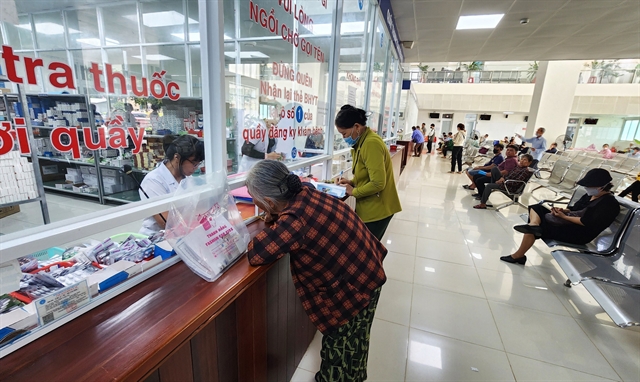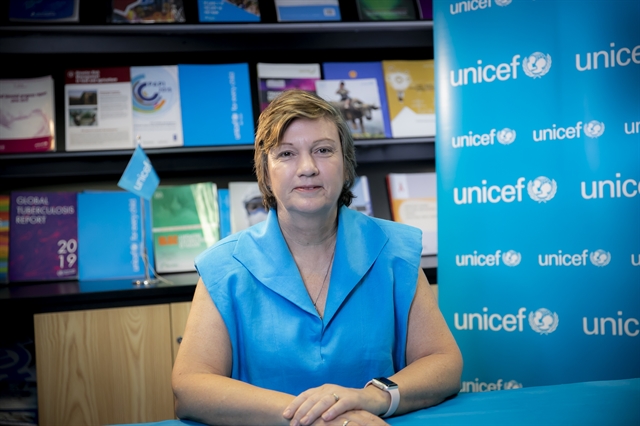 Opinion
Opinion

UNICEF Representative in Việt Nam Rana Flowers talks to the press about impacts of COVID-19 on children's mental health on the launch of the State of the World’s Children 2021 report "On My Mind: Promoting, protecting and caring for children’s mental health".

|
| UNICEF Representative in Việt Nam Rana Flowers. Photo courtesy of UNICEF |
UNICEF Representative in Việt Nam Rana Flowers talks to the press about impacts of COVID-19 on children's mental health on the launch of the State of the World’s Children 2021 report "On My Mind: Promoting, protecting and caring for children’s mental health".
How has children's mental health been affected before and during the COVID-19 pandemic?
The State of the World's Children 2021 report focuses on mental health and wellbeing and it makes some important shifts in how we think about our mental health.
We use the term mental health in the same way we think about physical health. Like our physical health, there are good times and there are challenging times when we have mental health. The problem is that we have stigmatised the expression and made people feel badly when they are facing the not so good times.
And that’s the first message of the UNICEF report – mental health is a positive state – and there is a continuum – from that feeling of wellbeing to having challenges that we cope with, challenges that just need some support, or challenges that need additional attention and care.
Get rid of the stigma – we all are on the continuum: Our goal as a society, as communities, as schools and as parents – must be to change the stigma around our mental health; to recognise the factors that threaten our mental health, to act as Governments and as parents to intervene early, to offer the support needed that can stop much more severe challenges arising.
Focus on wellbeing: We need to do more to focus on wellbeing – and to also have professional services when the challenges worsen. Like physical health – where we exercise or eat the right foods, there are steps we must each take that promote and protect our mental health.
Pre-COVID: It is extremely important to recognise that risks and challenges to our wellbeing, to our mental health pre-dated the COVID-19 pandemic. And it has caused more people, more children and more adolescents to face challenges and to experience those challenges more severely than they did before.
A year and a half into the COVID-19 pandemic, the impact on children and young people’s mental health and psychosocial well-being is measurable and it may be many years before we have a complete picture of just how many people have been affected.
UNICEF in Việt Nam is doing a study on the mental health and wellbeing of students in schools – with recommendations that will build on this global report as to how schools can do better.
With lockdowns and pandemic-related movement restrictions, it has been a long 18 months, especially for children. Here in Việt Nam and in countries all over the world, we are seeing many children feeling afraid, lonely, anxious, and very concerned for their future.
Indeed even when the pandemic has finally faded away – the economic and social impact will linger – the pressures to feed children, keep children in school, to catch up on schoolwork – will hang over the aspirations and lifetime earning of a generation whose education has been disrupted.
In Việt Nam, an earlier epidemiological survey of a nationally representative population from 10 of the country’s 63 provinces found that the overall level of child mental health problems was around 12 per cent, suggesting that before COVID more than three million children are in need of additional support and mental health services. The most common types of mental health problems among children studied in Việt Nam include anxiety, depression, loneliness and externalising problems (such as hyperactivity and attention deficit issues). While there is increasing concern over the rates of suicide among young people in Việt Nam, the country’s reported suicide rate remains low compared with global estimates.
Even before COVID, UNICEF studies had indicated that the challenges to children’s mental health are increasing. High expectations, pressure from family and school, parents fighting, social norms, including early marriage, which often place girls at a disadvantage to boys, and increasing exposure to the internet are potential mental health and psychosocial wellbeing risk factors. These may result in social isolation, worries, sadness, anxiety, depression, feelings of hopelessness and, in some cases, suicide.
What can parents do to help their children maintain optimal mental health and wellbeing?
There are three layers to the support that children and adolescents need.
Parents and caregivers are the first layer – and our first step is to increase our understanding of mental health – so that we can create a space where our children speak, where we can recognise signs and act to reduce the risks or seek help.
If there is violence or abuse in the home or school – these are major triggers for challenges to our mental health – and steps must be immediately taken to stop the abuse and protect children.
Improved parenting skills are a key positive factor in mitigating psychosocial stress and mental health issues.
Through the report, what are UNICEF’s recommendations to the family and the Government?
Raising awareness at all levels of the need to address children and young people’s psychosocial wellbeing is critical, none of which can be accomplished without appropriate policy frameworks, budgetary allocations and collaboration among different sectors.
The State of the World’s Children 2021 calls on governments, and public and private sector partners, to commit, communicate and act to promote mental health for all children, adolescents and caregivers, protect those in need of help, and care for the most vulnerable.
The Government must increase its investment in mental health services. Việt Nam needs a National Mental Health strategy for children and adolescents. UNICEF stands ready to work with them to develop this. In that strategy, in that investment, do NOT treat mental health as just a ‘health’ issue. Several sectors play a key role including the education sector and social protection sectors.
In that strategy and in that investment, paying attention to promoting strong wellbeing and positive mental health is key. Investing in the promotion of information and empowering parents, introducing parenting support programmes; empowering schools and empowering children and young people to have strategies to deal with the not so good days is incredibly cost effective. Government needs to introduce positive messaging around a strong nation with strong mental health and act to end the stigma around mental health.
We also need to invest in prevention. Việt Nam needs trained professionals to support prevention and response to child protection issues, gender based violence and mental health challenges. We appeal to the Government to have an exception to Administrative Reform and create new social work positions in districts. Việt Nam must strengthen and increase the quantity and quality of human resources for mental health, including doctors, counsellors, social workers, psychologists as well as increasing the number and quality of mental health and psychosocial-related services. The mental health of parents and caregivers is also very important – having services for those in need is important.
The role of schools is essential. In schools, Governments can do several really positive steps. An investment in wellbeing in schools has been shown to have an amazing rate of return: for every $1 spent – the society benefits $21 – this is a good investment.
And finally, Government needs to integrate mental health services into social protection and community care systems. To reach children and young people without access, services need to be provided not just through health or education systems but across a wide range of sectors and delivery platforms, including social protection and community care.
The report also points to the extremely negative experience by children across the world of institutionalisation and boarding schools – and thus a commitment to a plan for deinstitutionalisation; and a commitment to no more residential facilities would be a great step forward for children’s mental health. — VNS




